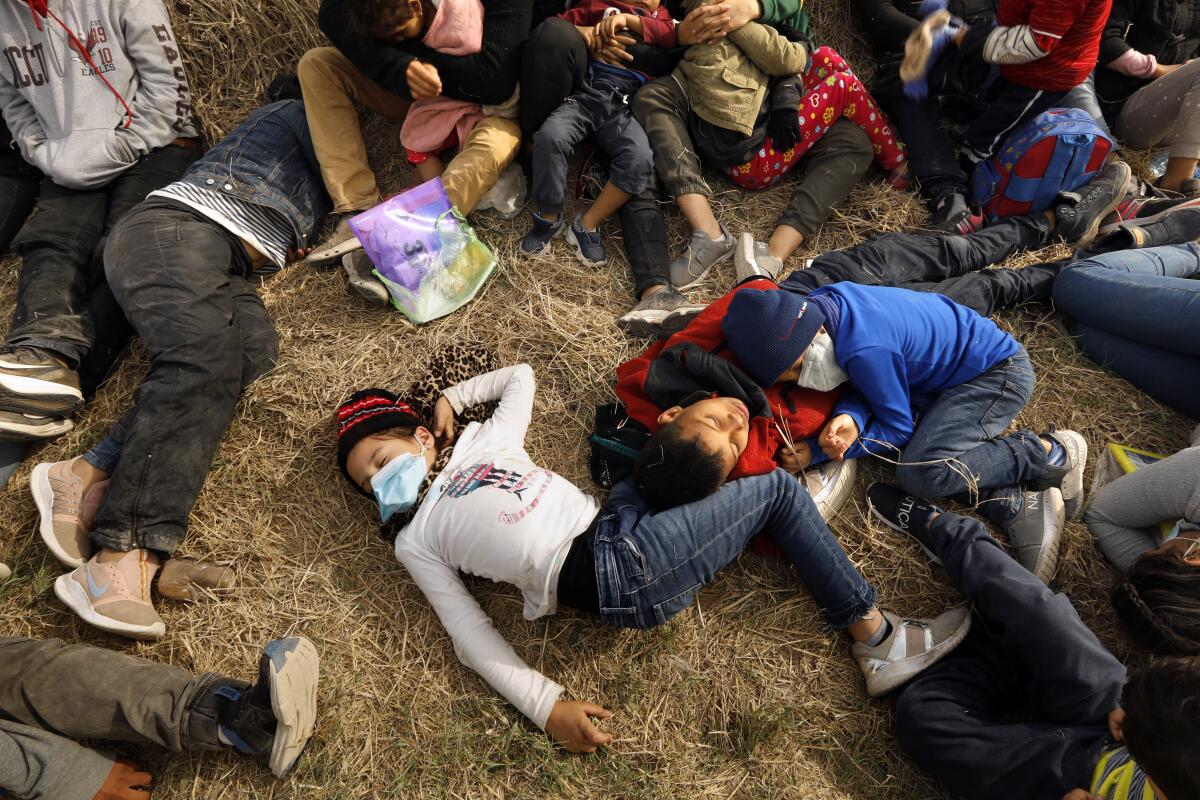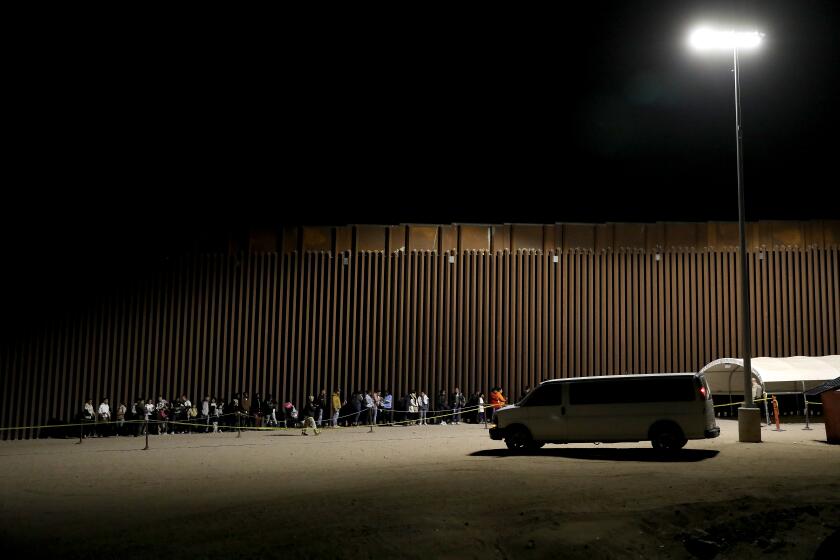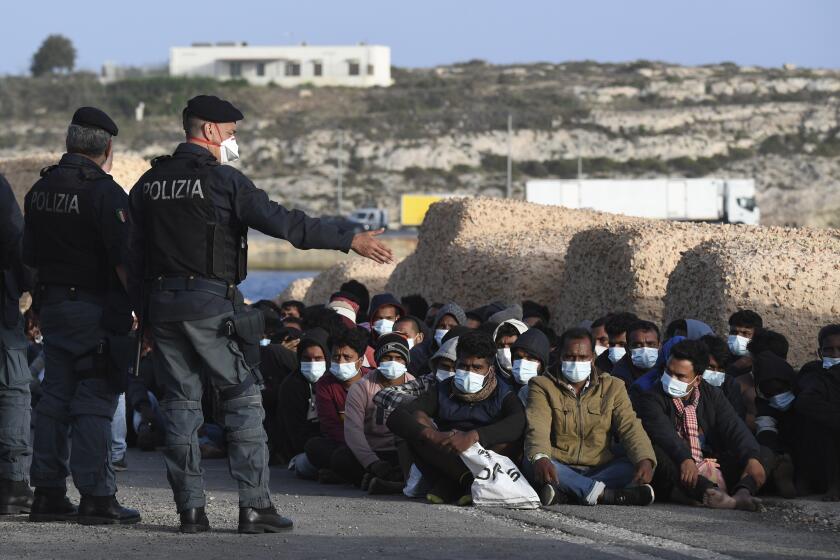Opinion: How the U.S. is repeating Europe’s failed migration policies

- Share via
In early May, standing at the border fence between El Paso, Texas, and Ciudad Juárez, Mexico, I was reminded of the Mediterranean Sea, Europe’s “natural border.” I met young Haitians and people from other countries fleeing political instability and violence — their wearied faces and stories of perilous journeys through multiple countries tragically echoed the many migrants I’ve met in North Africa. And now the next phase of U.S. migration policy seems doomed to also follow Europe’s failed approach.
In an effort to curb crowds crossing into the United States, the Biden administration announced last month it will set up regional processing centers in Latin America where migrants can apply for asylum. “International partners,” such as the United Nations refugee agency, will screen migrants, while Canada and Spain said they would accept referrals from these centers. This program will effectively restrict U.S. asylum.
As a scholar researching European migration policies, I find the outsourcing and relocation of immigration operations outside a country’s borders all too familiar. For more than three decades, the European Union and its member states have tried to externalize asylum and migration management to nations outside Europe. But Europe’s externalization policies haven’t worked. They have proved ineffective, extremely expensive and undermined the very foundations of international law.
The Biden administration seems to spend more effort struggling with the messaging of the border crisis than the actual crisis.
Since the 1990s, the EU has sought to move migration management to “third countries” to prevent irregular migrants, including asylum seekers, from reaching EU territory. The idea is framed as a humanitarian approach, with the objective to “save lives and disrupt migrant smuggling networks.” Yet, in the wake of this externalization, human rights organizations have cataloged a spectrum of violence and human rights abuses.
These externalization policies take several different forms. There are European partnerships with the governments of Tunisia, Libya, Morocco, Sudan and Turkey, who act on behalf of the EU as “migration managers” keeping migrants away from the EU. European countries also transfer their border control in the Mediterranean by pouring millions of dollars into bolstering the Libyan and Tunisian coast guards, through training, technical and logistical support. Their goal is for these countries to intercept and forcibly return migrants and asylum seekers back to Tunisian or Libyan shores. The horrors and human rights abuses awaiting these migrants in Libyan detention centers, run by the government or militias, have been well documented over the years and are a consequence of European externalization policies.
Externalization efforts also strain local economies and resources. When migrants are held back in these third countries, the situation creates tensions within communities. This has recently been on full display in Tunisia, where a surge in xenophobic attacks on migrants have taken place amid deep economic crisis. I have visited overcrowded and underfinanced shelters run by aid agencies along the North African borderlands. Here people are stored and contained, because of externalization policies. The U.S. will create the first American regional processing centers in Guatemala and Colombia, countries people are already fleeing due to economic precariousness, government corruption and violence. The plans raise many questions: How will these countries handle potentially large numbers of people waiting their turn at such centers? How long will they be kept there, and are they free to leave?
A key actor in Europe’s externalization efforts is Denmark, my home country. Often praised for its welfare system and its role as a “humane internationalist,” Denmark has transformed into a hard-liner on migration and asylum. The Danish government has been leading the political drive to establish extraterritorial facilities and camps outside Europe. Migrants who arrive in Denmark would be sent to these facilities. The Danish parliament passed a law to establish the camps and considered Rwanda as a hosting partner for these facilities. The U.K. has followed suit with a similar proposal to send asylum seekers to Rwanda.
While both the Danish and British plans were recently temporarily put on hold, they follow a terrible precedent by Israel, which between 2014 and 2017 had a similar model, transferring thousands of asylum seekers from Israel to Rwanda. This failed miserably as many were exposed to abuse upon arrival and subsequently took the route up through North Africa and across the Mediterranean to Israel, again. In my own research, I’ve seen migrant women fleeing Libyan detention centers, being intercepted at sea by the EU-funded coast guards and returned to detention centers. They just escape and attempt to make the journey again.
Migrants are not afforded the same rights and support systems as refugees.
Although European politicians and policymakers argue that their programs would reduce smuggling, research shows that the closure of borders in Europe has increased the demand for, and use of, smugglers. It forces migrants to take longer and more dangerous routes, creating repeat business for smugglers, and results in high-risk journeys and preventable deaths.
It’s been uncanny to hear parallels between U.S. and European rhetoric. The Biden administration as well as the EU and the Danish government use similar language when describing their policies: The system is broken or we want to go after the smugglers or this is a humane approach and this will save lives. The EU has spent billions of dollars on fences and barbed wire and border surveillance. Still, we are currently witnessing some of the highest numbers of migrants attempting to cross into Europe since the so-called migration crisis in 2015. The number of migrant deaths in the central Mediterranean Sea has also reached its highest point in six years, making the world’s most dangerous migration route even deadlier.
This reinforces why we need safe and legal pathways for migration. In the absence of long-term sustainable international solutions, we will continue to see dangerous and shortsighted policies that operate through deterrence and externalization. If those lessons are not learned, I fear the coming U.S. externalization efforts will only mirror the devastating scenes I’ve seen in Europe’s extended borders.
Ahlam Chemlali is a visiting scholar at UCLA, and a PhD fellow at the Danish Institute for International Studies and Aalborg University, Copenhagen. @AhlamChemlali
More to Read
A cure for the common opinion
Get thought-provoking perspectives with our weekly newsletter.
You may occasionally receive promotional content from the Los Angeles Times.












